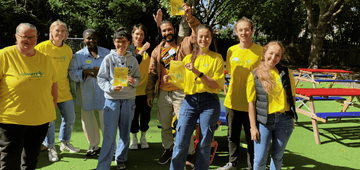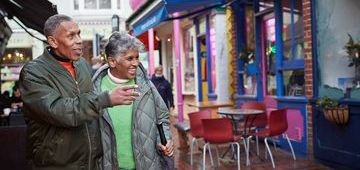
Nelly Araujo, Development Manager at RSPH, introduces our Community Spirit programme and explains how community organisations have made a huge impact on the health and wellbeing of their area during the Covid-19 crisis.
Covid-19 has changed the way we live and has unveiled features of our society that were perhaps less apparent or had been forgotten in the midst of modern life.
Our community spirit has perhaps been one of the most notable examples of this. This has included the overwhelming response to the call to volunteer for the NHS, the emergence of thousands of local mutual aid groups, the ability shown by local community groups to respond to the changing needs of their members and the calls for help made by local authorities, all demonstrate how and why communities are a force of change.
In 2019, thanks to the support of the Health Foundation, we had the opportunity to test an idea: Does raising community spirit help improve the health and wellbeing of communities? Although there is decades of work and research on how and why community development is important to public health, there was still a lack of recognition towards communities as an asset to the wider health system.
We looked at the literature and despite some attempts to use the concept of community spirit to describe other community development concepts, such as social capital and sense of belonging, we did not find any attempts to actually operationalise it. Perhaps it is too nebulous to ever be academically defined or measured?
However, we noticed that community spirit has a strong and positive lay value. It is easy to understand and is both unthreatening and aspirational. Most people light up when they are asked to describe it.
We went to talk to grassroots organisations from Locality’s Health and Wellbeing Network and launched a survey to ask people to define 'community spirit'.
Most people mentioned four things:
- Feelings of belonging to a group
- A group that integrates, respects and celebrates its members
- Having good relationships with neighbours
- Being able and willing to take action, for the benefit of all, but particularly for those who need it the most.
Off the back of our survey results, we came up with a working definition for community spirit:
'The feelings of connection and belonging to a community and our ability to come together to improve wellbeing for everybody.'
Using these ideas, we came out with four pillars for a framework to help define and assess community spirit within a community of place, with a view of fostering community-led plans that improve the health and wellbeing of its members.
We were just about to test this work with seven community organisations, when we had to put this on hold due to the Covid-19 crisis. The community organisations in our project have become busier than ever and are giving us daily masterclasses of what community spirit looks like. What’s more, these are just a small sample of the tens of thousands of local players who have become essential in galvanising local response efforts.
Southern Brooks Community Partnerships, has become the lead response partner for the third sector in South Gloucestershire, working directly with the community, the local authority and NHS to provide practical support to those identified as vulnerable or high risk. Coordinating local support work, they have been able to find local solutions for the community. They can help with access to emergency food and regular phone calls to check on people who may be lonely and isolated.
Armoy Community Association in Northern Ireland has set up a support group for high-risk people or those struggling with self-isolation in their village. Worried about the rapid spread of Covid-19 in in China, Italy and other parts of the world, they quickly recruited more volunteers and started to reach the community through leaflets and social media. By the time the authorities had declared their plans, Armoy had the community well prepared to protect themselves.
FWT – A Centre for Women, a women-only community organisation in Coventry, has been working around the clock to maintain and increase their support to local vulnerable women, most of them from BAME groups. From integration support, perinatal health, to domestic violence help, they are making sure no woman in their locality is unsupported in these desperate times.
Thanks to the work of these organisations and others, we are learning in practical terms how we can come out of the Covid-19 crisis and face the future and current challenges of inequity and exclusion.
Our communities are not passive recipients of interventions, hosts of small group activists working at micro level or sources of volunteers for development projects. Our communities are hubs of assets where we all fit in. Our communities are our first responders and our nearest source of support. Our communities are pivotal for the change, we in public health strive for; namely, that everyone has the opportunity and ability to lead a healthy life. This includes prevention and the realisation that community spirit protects our health and saves lives. This is why community spirit matters.



